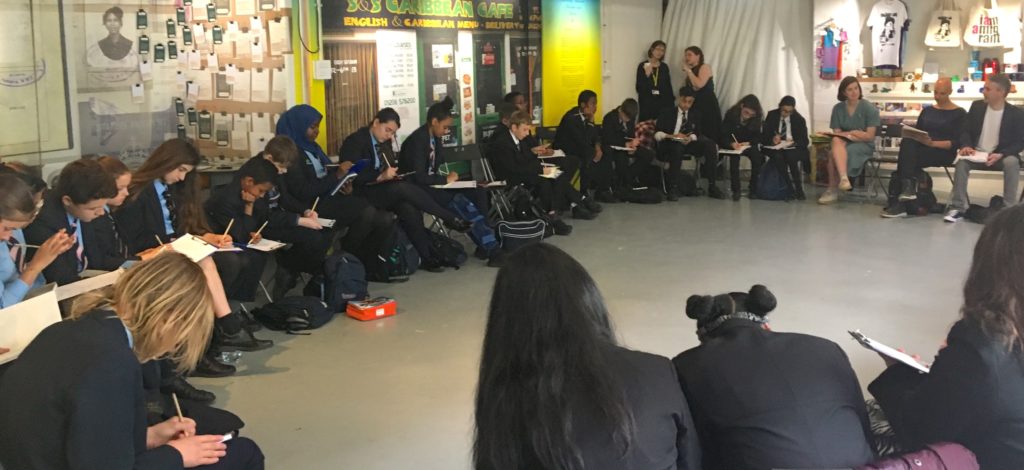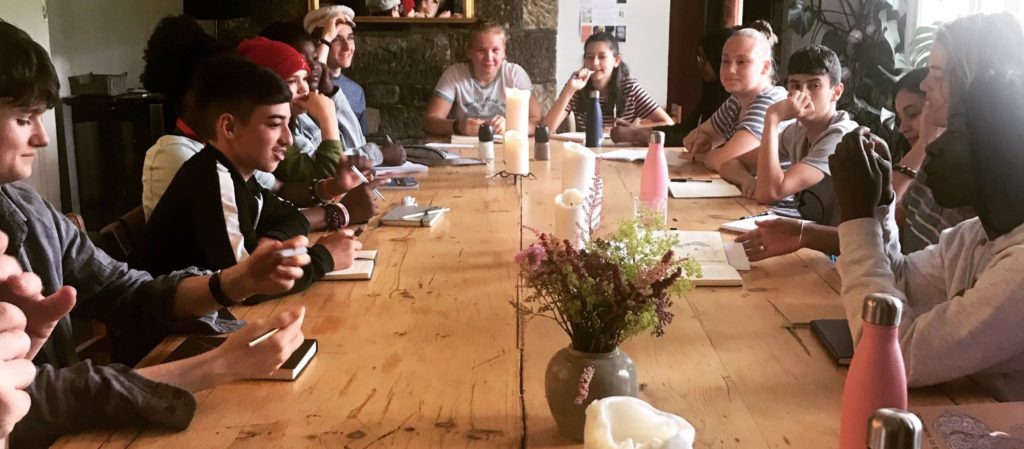Fittingly, my first day as First Story’s new Chief Executive was also National Writing Day. And what an inspiring day it was. My first stop on 26th June was to the Museum of Migration in Lambeth, where I joined First Story students from three of our London schools at a special event.
I was utterly impressed by how our guest writers guided and supported the group through various writing exercises; how the young people used a host of techniques they had learnt through participation in our intensive Writer-in-Residence programme; and how they all knuckled down to their writing tasks instantly.
In true First Story spirit, I wrote too. I learnt so much about how brilliant our programme is, simply by taking part in that session. I found myself thinking in an entirely different way. Writing creatively opened up the world, it demanded rigour and deep contemplation. It was also hugely energising. Time to think like that doesn’t happen every day, but it is so rich.
And then we read our work. The calibre of the writing that the young people produced that day convinced me that what we do at First Story is exceptional.

I’ve since read much more of our young writers’ work, published in First Story’s anthologies. I’ve attended some anthology launch events too, where graduates of our flagship programme are presented with their newly-printed publication, celebrated by the school community and their families. It was rewarding to see how proud and confident all of the students were – as were the parents and carers who had come along to listen.
I was also privileged to pay a visit to our summer residential course in July, at Arvon’s Lumb Bank centre in West Yorkshire. Sixteen talented First Story graduates from across England attended the week-long writing retreat, to work intensively with our Writers-in-Residence Rebecca Tantony and Dan Powell. Once again, I was amazed at how quickly a group of 13 to 17 year-olds got down to their writing, at how serious they were, but above all, at the range of the work they created.

And it was really joyful. First Story writers are often so witty. Energy runs through them. There is a wonderful, playful freedom in much of what they say. I laughed a lot, reading and listening to the young people’s work. But I also read tough and brave work, reflecting the world many of our students live in. I admired the ambition in their work too – young people are not afraid to tackle big existential subjects or to take in something completely new to their experience.
Anyone who wants to know what Generation Z thinks, should start with our anthologies.
Some of the students at Lumb Bank were also thinking about their futures; one young woman was torn between applying for English or Law at university – it seemed to her to be a choice between heart and mind. Two weeks later, the A level results crystallised that choice for many students. Worryingly, fewer people are taking English A level nowadays. Since 2016, there has been a 15% decline in the take-up of English A level, whilst the numbers taking STEM subjects continues to rise; the effect of a sustained government campaign for STEM subjects and general anxiety about employability.
I believe English isn’t just a subject of the heart. It is as much a necessary choice for managing in the modern world. Writing is at the core of how we communicate and share with each other. Stories are how we learn. Writers make sense of the world for us. We use language to speak and make sure our point of view is heard. The recent record donation to Oxford University, to build a new Humanities Centre, restates how important arts, literature and philosophy are to give us an ethical base, to manage a world where AI will increasingly be leading the way. A world without strong ethical values is a dangerous one. Too much is changing too fast to risk it.
Over the past three years, First Story has extended its reach to new parts of England. It is exciting to see the diversity of students who now benefit from our programmes. At Lumb Bank, I chatted to a student from one of our Lincolnshire schools. They returned to a relatively isolated community, geographically cut-off from access to extra-curricular cultural learning.
It seems even more important to focus on building our capacity across Yorkshire and the Midlands, over the next few years, where we know there is real need.
Around 30% of children live in poverty in Yorkshire and the East Midlands (with that figure projected to rise over the next few years). There are brilliant potential partners in these places – some of whom we already work with – to help us make the most of what we can offer young people. I’m looking forward to developing new partnerships with universities and cultural organisations to give more opportunities to our graduates.
First Story’s capacity to bring students together from different parts of the country, through our festival and residential programme, is a huge benefit. On a micro scale, watching sixteen students from utterly different communities cooking dinner together at Arvon, making new friends, and sharing their thoughts and feelings, felt like an important thing. Not only did it broaden their horizons, it connected diverse young people in an increasingly polarised world. A benefit beautifully expressed by one of our young writers at Lumb Bank:
“We go round and round in a circle of synchronisation
We go, we go
We’ll sit, side by side, like everything I’d never believed in.”


 The First Story Summer Residential 2019
The First Story Summer Residential 2019
